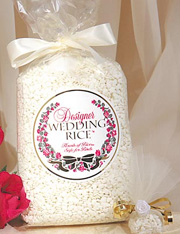 Since early Roman times some grain - usually
wheat - has been associated with the wedding ceremony. Since early Roman times some grain - usually
wheat - has been associated with the wedding ceremony.
The basis for the predominant theory as to why rice and other
grains, such as wheat, have played a prominent role in marriage
ceremonies for centuries, is that they are fraught with symbolism of fertility and of prosperity. By throwing
rice at the bride and groom at a wedding, guests symbolically wish
them a lifetime full of these blessings.
Historically, in certain primitive tribal cultures, the mere act
of supping on rice together bound a couple in matrimony, as eating this local food together
implied their living together. In other cultures, the symbolic
eating of rice together preceded a shower of rice over the married
couple.
Perhaps the most curious use of rice in the wedding ceremony, was
its use in some cultures not to unite the happy couple, but to feed
the uninvited evil spirits who always attended the ceremony. The
rationale behind this practice was to
ward off evil, as well-fed evil spirits
would bring no harm to the blissful
couple.
In early Roman times, wheat was the grain of choice for the
wedding ceremony, as wheat, not rice, symbolized fertility. The
virginal bride carried a sheaf of wheat in her hand throughout the
ceremony, or wore a garland of wheat in
her hair. Instead of the bride tossing a bouquet, as is
traditionally done today, wedding guests tossed grains of wheat at
her, and young, single girls clambered for the grains that bounced
off of the young bride, believing that these grains could ensure
them a trip down the bridal path soon thereafter.
The wheat tossing custom fell by the wayside under the reign of
Queen Elizabeth I of England, when the once airborne wheat instead
was baked into small cakes, which the guests then crumbled and
tossed over the bride's head. Even this tradition gave way to
another, in which a large wheat cake was baked, then eaten, not
tossed. Wedding guests, literally left empty-handed, had no recourse but to find a suitable substitute
for the costly wheat cakes. They needed something to toss at the
bride to reinstate themselves as active participants in the
ceremony. The natural choice was none other than cheap, clean, white
rice, and the tradition then born has stuck to this day. |
|
note:
fraught:
充滿
fertility:
肥沃,多產(chǎn)
matrimony:
結(jié)婚
rationale:
基本原理
ward off: 避開,擋住
blissful: 有福的
virginal: 貞潔的,無暇的
sheaf:
捆,束
garland:
花環(huán)
recourse:
求助,追索權(quán) | |